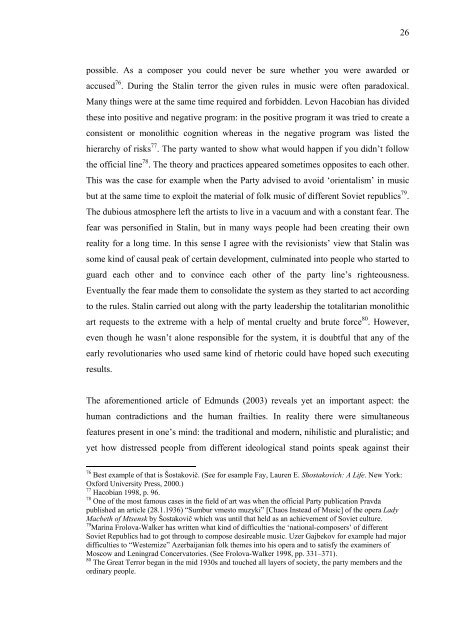Boris Asaf'ev and the Soviet Musicology - E-thesis
Boris Asaf'ev and the Soviet Musicology - E-thesis
Boris Asaf'ev and the Soviet Musicology - E-thesis
Create successful ePaper yourself
Turn your PDF publications into a flip-book with our unique Google optimized e-Paper software.
possible. As a composer you could never be sure whe<strong>the</strong>r you were awarded or<br />
accused 76 . During <strong>the</strong> Stalin terror <strong>the</strong> given rules in music were often paradoxical.<br />
Many things were at <strong>the</strong> same time required <strong>and</strong> forbidden. Levon Hacobian has divided<br />
<strong>the</strong>se into positive <strong>and</strong> negative program: in <strong>the</strong> positive program it was tried to create a<br />
consistent or monolithic cognition whereas in <strong>the</strong> negative program was listed <strong>the</strong><br />
hierarchy of risks 77 . The party wanted to show what would happen if you didn’t follow<br />
<strong>the</strong> official line 78 . The <strong>the</strong>ory <strong>and</strong> practices appeared sometimes opposites to each o<strong>the</strong>r.<br />
This was <strong>the</strong> case for example when <strong>the</strong> Party advised to avoid ‘orientalism’ in music<br />
but at <strong>the</strong> same time to exploit <strong>the</strong> material of folk music of different <strong>Soviet</strong> republics 79 .<br />
The dubious atmosphere left <strong>the</strong> artists to live in a vacuum <strong>and</strong> with a constant fear. The<br />
fear was personified in Stalin, but in many ways people had been creating <strong>the</strong>ir own<br />
reality for a long time. In this sense I agree with <strong>the</strong> revisionists’ view that Stalin was<br />
some kind of causal peak of certain development, culminated into people who started to<br />
guard each o<strong>the</strong>r <strong>and</strong> to convince each o<strong>the</strong>r of <strong>the</strong> party line’s righteousness.<br />
Eventually <strong>the</strong> fear made <strong>the</strong>m to consolidate <strong>the</strong> system as <strong>the</strong>y started to act according<br />
to <strong>the</strong> rules. Stalin carried out along with <strong>the</strong> party leadership <strong>the</strong> totalitarian monolithic<br />
art requests to <strong>the</strong> extreme with a help of mental cruelty <strong>and</strong> brute force 80 . However,<br />
even though he wasn’t alone responsible for <strong>the</strong> system, it is doubtful that any of <strong>the</strong><br />
early revolutionaries who used same kind of rhetoric could have hoped such executing<br />
results.<br />
The aforementioned article of Edmunds (2003) reveals yet an important aspect: <strong>the</strong><br />
human contradictions <strong>and</strong> <strong>the</strong> human frailties. In reality <strong>the</strong>re were simultaneous<br />
features present in one’s mind: <strong>the</strong> traditional <strong>and</strong> modern, nihilistic <strong>and</strong> pluralistic; <strong>and</strong><br />
yet how distressed people from different ideological st<strong>and</strong> points speak against <strong>the</strong>ir<br />
76<br />
Best example of that is Šostakovič. (See for esample Fay, Lauren E. Shostakovich: A Life. New York:<br />
Oxford University Press, 2000.)<br />
77<br />
Hacobian 1998, p. 96.<br />
78<br />
One of <strong>the</strong> most famous cases in <strong>the</strong> field of art was when <strong>the</strong> official Party publication Pravda<br />
published an article (28.1.1936) “Sumbur vmesto muzyki” [Chaos Instead of Music] of <strong>the</strong> opera Lady<br />
Macbeth of Mtsensk by Šostakovič which was until that held as an achievement of <strong>Soviet</strong> culture.<br />
79<br />
Marina Frolova-Walker has written what kind of difficulties <strong>the</strong> ‘national-composers’ of different<br />
<strong>Soviet</strong> Republics had to got through to compose desireable music. Uzer Gajbekov for example had major<br />
difficulties to “Westernize” Azerbaijanian folk <strong>the</strong>mes into his opera <strong>and</strong> to satisfy <strong>the</strong> examiners of<br />
Moscow <strong>and</strong> Leningrad Concervatories. (See Frolova-Walker 1998, pp. 331–371).<br />
80<br />
The Great Terror began in <strong>the</strong> mid 1930s <strong>and</strong> touched all layers of society, <strong>the</strong> party members <strong>and</strong> <strong>the</strong><br />
ordinary people.<br />
26

















